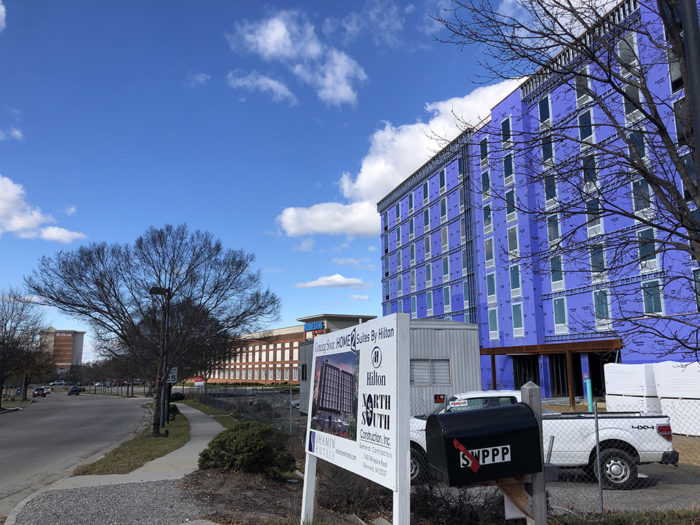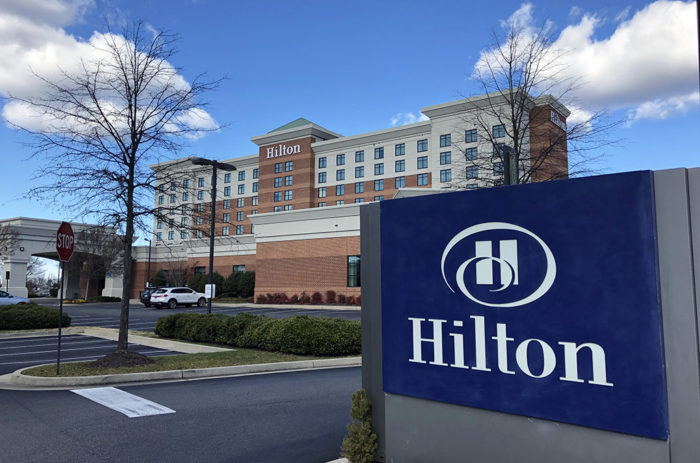A Richmond-area hotelier is on the verge of losing one of its Henrico properties to foreclosure, as the pandemic continues to batter the hospitality industry.
Shamin Hotels is in discussions to allow the noteholder on its Hilton Richmond Hotel & Spa in Short Pump to take control of the property at 12042 W. Broad St. through receivership and an eventual public auction.
The pending transfer of control comes after Chester-based Shamin, which owns more than 60 hotels mostly around the mid-Atlantic, fell behind on loan payments on the 254-room Short Pump Hilton in April, as COVID-related closures and social distancing were in full effect.
Shamin CEO Neil Amin said the Short Pump Hilton has been hit particularly hard during the pandemic because of its reliance on event and conference revenue and the room bookings that come along with such large gatherings.
“Our larger full-service conference hotels like the Hilton were the worst affected as 80 percent of our revenue (at that hotel) is generated by conference, banquet, and group business, which has become non-existent for the foreseeable future,” Amin said.
“Our revenue at the Hilton since the pandemic began is a little over $5 million versus over $15 million last year during those same months,” he added.
Shamin built and opened the Short Pump Hilton in December 2009, and took out a $45 million loan secured by the property in 2013 from JP Morgan Chase. The note was then bundled into a package of commercial mortgage-backed securities or CMBS.
The group pursuing the receivership and foreclosure is an entity representing the holders of the CMBS loan. That group, acting as 12042 West Broad Street Holdings LLC, filed suit in Henrico County Circuit Court on Dec. 2 to have the court appoint a receiver to take over the hotel.
While Shamin said his company has been in negotiations with the noteholder to try to prevent losing the property, a deal couldn’t be reached and the loan remains in default. He said the loss of revenue and the uncertain outlook for the property left Shamin with little choice.
“We are not doing anything to stop the (foreclosure) process and we have told the controlling noteholder, who appears to be a large global asset manager, that we would be cooperative with whatever they decide,” he said. “The commencement of receivership and foreclosure proceedings was essentially a process that was agreed to by both parties together.”
Amin said both sides are finalizing a consent order to allow the noteholder to take over the property immediately, including using its state liquor license until they can secure their own.
The noteholder asked the court to appoint Northern Virginia-based Crescent Hotel Management Services as receiver to keep the property open and running without disruption. Rooms at the Hilton currently range from $126 per night up to $489 for a suite. Once in receivership, the noteholder said it expects to pursue a foreclosure and a subsequent public auction.
The noteholder claims in its filing that receivership is necessary after Shamin wouldn’t bow to its terms during negotiations in recent months. Amin said his company was willing to be flexible, going as far as offering to make interest-only payments for a period of time and pay the loan in full at maturity in order to prevent foreclosure. He said Shamin also offered to pay off the loan “at a value significantly higher than the lender’s own valuation.”
“All of these proposals were rejected and the only proposal the lender provided included significant lender fees and unsuitable guarantees under current conditions,” Amin said, adding that his company is still open to discussing any reasonable solution.
The noteholder is represented by attorney Stephen Gallegher of the Venable law firm in Northern Virginia. Gallegher did not respond to a request for comment.
The noteholder said in its Dec. 2 filing that the loan has a balance of $46 million and that the property could be worth as little as $26 million.
Shamin’s decision to let the property go is made easier given that the CMBS loan is a non-recourse loan, meaning the noteholder can’t come after the borrower for the remaining balance after foreclosure.
Amin said Shamin typically uses non-recourse loans for its largest properties because their value fluctuates. Eighteen of the company’s 62 hotels are non-recourse CMBS loans.
He said those loans offer protection should something unforeseen greatly affect the value of a property, such as a pandemic — but no one, not borrower nor lender, planned for a pandemic of this sort.
“I don’t think anybody in our industry has planned for this,” Amin said.

Shamin’s new Home2Suites hotel, with the Hilton visible in the distance, is under construction. (Michael Schwartz photo)
Shamin hasn’t lost any of its other hotels to receivership or foreclosure during the pandemic, Amin said, adding that the bulk of its lenders have shown patience.
“All of our traditional lenders and most of the non-recourse lenders have been extremely supportive,” he said.
Many lenders have allowed Shamin to be flexible in ways the Hilton noteholder would not, such as deferring loan payments and using certain amounts of reserves for mortgage payments in the interim.
“Traditional lenders realize this is a temporary situation,” he said, adding that the company informed its other lenders about the Hilton Short Pump situation and they are supportive.
Amin doesn’t hide that the pandemic has hit Shamin hard. He said the company’s revenue dropped 90 percent in the early days of the downturn. It had to furlough some of its 1,500 employees early in the pandemic but has since brought many of them back as hotel occupancy rates have ticked up slowly.
It was able to get PPP loans on some of its properties and has donated $100,000 to set up a relief fund for its workers.
“We also did not cut salaries or wages at any time and have paid out over $500,000 in discretionary bonuses to our associates to support them during this pandemic,” Amin said.
Amin said extended stay hotels are among the better performers in its portfolio at the moment with around 60 percent occupancy because such properties allow the guests to spread out a bit with in-room kitchens and other amenities.
And the company continues to make investments in new properties, looking beyond the pandemic, including two that will make the loss of the Short Pump property easier to swallow.
Visible from the Hilton within the same Town Center West development, construction on the company’s new Home2Suites is well underway at 209 Towne Center West Blvd.
Just to the west, the company also has a Hampton Inn & Suites in the works next to the GreenGate development. Shamin also recently broke ground on a Home2Suites next to its Embassy Suites property near the corner of West Broad Street and Glenside Drive.
“We’re going to continue on with the projects we have,” Amin said. “We definitely believe that long-term, hospitality will come back in a strong way.”
A Richmond-area hotelier is on the verge of losing one of its Henrico properties to foreclosure, as the pandemic continues to batter the hospitality industry.
Shamin Hotels is in discussions to allow the noteholder on its Hilton Richmond Hotel & Spa in Short Pump to take control of the property at 12042 W. Broad St. through receivership and an eventual public auction.
The pending transfer of control comes after Chester-based Shamin, which owns more than 60 hotels mostly around the mid-Atlantic, fell behind on loan payments on the 254-room Short Pump Hilton in April, as COVID-related closures and social distancing were in full effect.
Shamin CEO Neil Amin said the Short Pump Hilton has been hit particularly hard during the pandemic because of its reliance on event and conference revenue and the room bookings that come along with such large gatherings.
“Our larger full-service conference hotels like the Hilton were the worst affected as 80 percent of our revenue (at that hotel) is generated by conference, banquet, and group business, which has become non-existent for the foreseeable future,” Amin said.
“Our revenue at the Hilton since the pandemic began is a little over $5 million versus over $15 million last year during those same months,” he added.
Shamin built and opened the Short Pump Hilton in December 2009, and took out a $45 million loan secured by the property in 2013 from JP Morgan Chase. The note was then bundled into a package of commercial mortgage-backed securities or CMBS.
The group pursuing the receivership and foreclosure is an entity representing the holders of the CMBS loan. That group, acting as 12042 West Broad Street Holdings LLC, filed suit in Henrico County Circuit Court on Dec. 2 to have the court appoint a receiver to take over the hotel.
While Shamin said his company has been in negotiations with the noteholder to try to prevent losing the property, a deal couldn’t be reached and the loan remains in default. He said the loss of revenue and the uncertain outlook for the property left Shamin with little choice.
“We are not doing anything to stop the (foreclosure) process and we have told the controlling noteholder, who appears to be a large global asset manager, that we would be cooperative with whatever they decide,” he said. “The commencement of receivership and foreclosure proceedings was essentially a process that was agreed to by both parties together.”
Amin said both sides are finalizing a consent order to allow the noteholder to take over the property immediately, including using its state liquor license until they can secure their own.
The noteholder asked the court to appoint Northern Virginia-based Crescent Hotel Management Services as receiver to keep the property open and running without disruption. Rooms at the Hilton currently range from $126 per night up to $489 for a suite. Once in receivership, the noteholder said it expects to pursue a foreclosure and a subsequent public auction.
The noteholder claims in its filing that receivership is necessary after Shamin wouldn’t bow to its terms during negotiations in recent months. Amin said his company was willing to be flexible, going as far as offering to make interest-only payments for a period of time and pay the loan in full at maturity in order to prevent foreclosure. He said Shamin also offered to pay off the loan “at a value significantly higher than the lender’s own valuation.”
“All of these proposals were rejected and the only proposal the lender provided included significant lender fees and unsuitable guarantees under current conditions,” Amin said, adding that his company is still open to discussing any reasonable solution.
The noteholder is represented by attorney Stephen Gallegher of the Venable law firm in Northern Virginia. Gallegher did not respond to a request for comment.
The noteholder said in its Dec. 2 filing that the loan has a balance of $46 million and that the property could be worth as little as $26 million.
Shamin’s decision to let the property go is made easier given that the CMBS loan is a non-recourse loan, meaning the noteholder can’t come after the borrower for the remaining balance after foreclosure.
Amin said Shamin typically uses non-recourse loans for its largest properties because their value fluctuates. Eighteen of the company’s 62 hotels are non-recourse CMBS loans.
He said those loans offer protection should something unforeseen greatly affect the value of a property, such as a pandemic — but no one, not borrower nor lender, planned for a pandemic of this sort.
“I don’t think anybody in our industry has planned for this,” Amin said.

Shamin’s new Home2Suites hotel, with the Hilton visible in the distance, is under construction. (Michael Schwartz photo)
Shamin hasn’t lost any of its other hotels to receivership or foreclosure during the pandemic, Amin said, adding that the bulk of its lenders have shown patience.
“All of our traditional lenders and most of the non-recourse lenders have been extremely supportive,” he said.
Many lenders have allowed Shamin to be flexible in ways the Hilton noteholder would not, such as deferring loan payments and using certain amounts of reserves for mortgage payments in the interim.
“Traditional lenders realize this is a temporary situation,” he said, adding that the company informed its other lenders about the Hilton Short Pump situation and they are supportive.
Amin doesn’t hide that the pandemic has hit Shamin hard. He said the company’s revenue dropped 90 percent in the early days of the downturn. It had to furlough some of its 1,500 employees early in the pandemic but has since brought many of them back as hotel occupancy rates have ticked up slowly.
It was able to get PPP loans on some of its properties and has donated $100,000 to set up a relief fund for its workers.
“We also did not cut salaries or wages at any time and have paid out over $500,000 in discretionary bonuses to our associates to support them during this pandemic,” Amin said.
Amin said extended stay hotels are among the better performers in its portfolio at the moment with around 60 percent occupancy because such properties allow the guests to spread out a bit with in-room kitchens and other amenities.
And the company continues to make investments in new properties, looking beyond the pandemic, including two that will make the loss of the Short Pump property easier to swallow.
Visible from the Hilton within the same Town Center West development, construction on the company’s new Home2Suites is well underway at 209 Towne Center West Blvd.
Just to the west, the company also has a Hampton Inn & Suites in the works next to the GreenGate development. Shamin also recently broke ground on a Home2Suites next to its Embassy Suites property near the corner of West Broad Street and Glenside Drive.
“We’re going to continue on with the projects we have,” Amin said. “We definitely believe that long-term, hospitality will come back in a strong way.”


This is what happens when government and media trot out the same stable of experts spewing non-scientific, hysterical, fear driven nonsense. Rarely do we hear from the many experts (e.g., Dr. Jay Bhattacharya, Dr. Sunetra Gupta) who will tell you the ineffectiveness of lockdowns, shutdowns and masks. “It’s all your fault, people. You are just not wearing those masks tight enough.”
P.S. to Shamin: move your operation to Florida where there is at least a modicum of sanity.
310,000 dead Americans and over 1 Million mourning family members disagree. It really is dangerous and not a conspiracy.
Sweden has a death rate of 720/million without a job destroying 9 month lockdown. The US rate is 920, with the destruction of hundreds of thousands of businesses and millions of jobs. The lockdown cure seems not to work, even though Sweden has now given in and joined the non-functional crowd.
Sweden has taken a significant hit on its economy, far higher than its immediate and alike neighbors in Scandinavia who took much stronger measures.
William, I take your comment seriously. Sweden certainly had a different approach, so I did some research to see what they did. As a socialist country, they initiated a national policy of requisite masking and social distancing rather than shutting down schools and businesses. It was heavily enforced with fines and prosecution. The Netherlands did it too.We could have done likewise but the national leadership chose a different course and the result was 51 disparate paths and degrees of enforcement. The end result is that we have one of the highest infection and death rates in the world, massive unemployment… Read more »
Sweden has also revised their approach. “Mmmm…we may have been wrong.” https://www.government.se/government-policy/the-governments-work-in-response-to-the-virus-responsible-for-covid-19/
oops. 320,000 dead now. its ramping up steeply as winter sets in. Florida has lost 20,000.
“modicum of sanity” must be code for @21,000 dead in Florida. good grief.